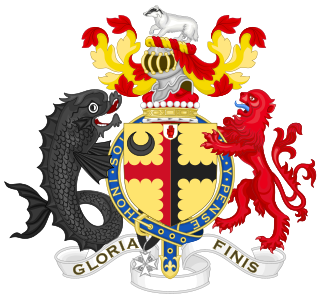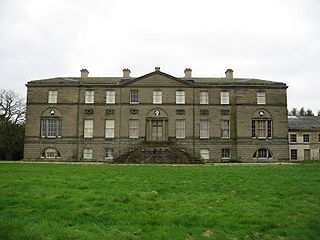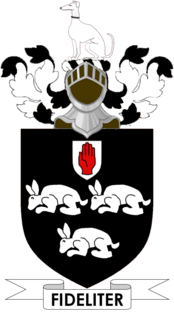
Earl Grey is a title in the peerage of the United Kingdom. It was created in 1806 for General Charles Grey, 1st Baron Grey. In 1801, he was given the title Baron Grey of Howick in the County of Northumberland, and in 1806 he was created Viscount Howick in the County of Northumberland, at the same time as he was given the earldom. A member of the prominent Grey family of Northumberland, Earl Grey was the third son of Sir Henry Grey, 1st Baronet of Howick.

Earl of Kingston is a title in the Peerage of Ireland. It was created in 1768 for Edward King, 1st Viscount Kingston. The Earl holds the subsidiary titles Baron Kingston, of Rockingham in the County of Roscommon, Viscount Kingston, of Kingsborough in the County of Sligo, Baron Erris, of Boyle in the County of Roscommon, and Viscount Lorton, of Boyle in the County of Roscommon, also in the Peerage of Ireland. He is also a baronet in the Baronetage of Ireland. Between 1821 and 1869 the earls also held the title Baron Kingston, of Mitchelstown in the County of Cork, in the Peerage of the United Kingdom.

Earl of Romney is a title that has been created twice.

Viscount Brookeborough, of Colebrooke in the County of Fermanagh, is a title in the Peerage of the United Kingdom. It was created in 1952 for the Ulster Unionist politician and Prime Minister of Northern Ireland, Captain The Rt. Hon. Sir Basil Brooke, 5th Bt., P.C. (N.I.), M.P.

Baron Hesketh, of Hesketh in the County Palatine of Lancaster, is a title in the Peerage of the United Kingdom. It was created in 1935 for Sir Thomas Fermor-Hesketh, 8th Baronet, who had previously briefly represented Enfield in the House of Commons as a Conservative. As of 2010 the titles are held by his grandson, the third Baron, who succeeded his father in 1955. Lord Hesketh held junior ministerial positions in the Conservative administrations of Margaret Thatcher and John Major. However, he lost his seat in the House of Lords after the House of Lords Act 1999 removed the automatic right of hereditary peers to sit in the upper chamber of Parliament.
Baron Acton, of Aldenham in the County of Shropshire, is a title in the Peerage of the United Kingdom. It was created on 11 December 1869 for Sir John Dalberg-Acton, 8th Baronet, a prominent historian and Liberal Member of Parliament.

Baron Northbourne, of Betteshanger in the County of Kent, is a title in the Peerage of the United Kingdom. It was created in 1884 for Sir Walter James, 2nd Baronet, who had earlier represented Kingston upon Hull in the House of Commons as a Conservative. His son, the second Baron, sat as a Liberal Member of Parliament for Gateshead. The latter's great-grandson, the fifth Baron, who succeeded his father in 1982, was one of the ninety elected hereditary peers that were allowed to remain in the House of Lords after the passing of the House of Lords Act 1999, and sat as a cross-bencher until his retirement in 2018. As of 2019, the titles are held by his son, the sixth baron, who succeeded his father in that year.

There have been two baronetcies created for persons with the surname Arthur, both in the Baronetage of the United Kingdom. As of 2014 both creations are extant.

The Broughton, later Broughton-Delves, later Broughton Baronetcy, of Broughton in the County of Stafford, is a title in the Baronetage of England. It was created on 10 March 1661 for Sir Brian Broughton, of Broughton Hall, near Eccleshall, Staffordshire, High Sheriff of Staffordshire from 1660 to 1661 and the member of an ancient Staffordshire family.

There have been four baronetcies created for members of the Acland family, which originated in the 12th century at the estate of Acland in the parish of Landkey, North Devon, two in the Baronetage of England and two in the Baronetage of the United Kingdom.
There have been four baronetcies created for persons with the surname Leslie, one in the Baronetage of Nova Scotia, one in the Baronetage of Ireland, one in the Baronetage of Great Britain and one in the Baronetage of the United Kingdom. Three of the creations are extant as of 2010.
There have been three baronetcies created for persons with the surname Kinloch, two in the Baronetage of Nova Scotia and one in the Baronetage of the United Kingdom. Two of the creations are extant as of 2010.

The Chaytor family is an English gentry family on which has been conferred two baronetcies, one in the Baronetage of England and one in the Baronetage of the United Kingdom and several knighthoods. As of 2008 one baronetcy is extinct.
There have been three baronetcies created for persons with the surname Bellingham, one in the Baronetage of England, one in the Baronetage of Ireland and one in the Baronetage of Great Britain. As of 2014 one creation is extant.
There have been two baronetcies created for persons with the surname Carden, one in the Baronetage of Ireland and one in the Baronetage of the United Kingdom. Both creations are extant as of 2010.
The Floyd Baronetcy is a title in the Baronetage of the United Kingdom. It was created on 30 March 1816 for General John Floyd. He was second-in-command at the Battle of Seringapatam in 1799. Floyd's daughter Julia was the wife of Prime Minister Sir Robert Peel, 2nd Baronet. The fifth Baronet was a Brigadier in the 15th/19th Hussars and was Chief-of-Staff of the Eighth Army from 1944 to 1945. Between 1961 and 1968 he served as Lord-Lieutenant of Buckinghamshire. The seventh Baronet was High Sheriff of Rutland in 1968. The fourth baronet's youngest son, Charles Murray Floyd, was a prominent businessman, surveyor and land agent.
Three Baronetcies have been created for persons with the surname Johnson: one of New York in 1755 in the Baronetage of Great Britain, and then one of Bath (1818) and one of Dublin (1909), both in the Baronetage of the United Kingdom. As of 2010 the Johnson baronetcy of New York is extant, the one of Bath is dormant, and the one of Dublin is extinct.
There have been two baronetcies created for members of the Wolseley family, one in the Baronetage of England and one in the Baronetage of Ireland. As of 2018 the Wolseley Baronetcy of Mount Wolseley is dormant.

The Wombwell Baronetcy, of Wombwell in the County of York, is a title in the Baronetage of Great Britain. It was created on 26 August 1778 for George Wombwell, Chairman of the Honourable East India Company and Member of Parliament for Huntingdon. The fourth Baronet fought in the Crimean War and took part in the Charge of the Light Brigade and in 1861 served as High Sheriff of Yorkshire. As of 13 June 2007 the presumed seventh and present Baronet had not successfully proven his succession to the title, and is therefore not on the Official Roll of the Baronetage, with the baronetcy considered dormant since 1977.

The Cunliffe Baronetcy, of Liverpool in the County of Lancaster, is a title in the Baronetage of Great Britain. It was created on 26 March 1759 for Sir Ellis Cunliffe, a slave trader and Member of Parliament for Liverpool. The fourth Baronet was a General in the Bengal Army. The fifth Baronet represented Flint Boroughs and Denbigh Boroughs in the House of Commons.











